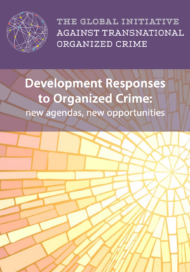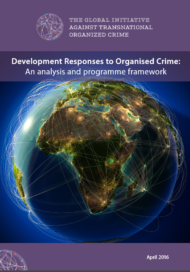Posted on 16 Nov 2015
There are a number of significant policy processes advancing that are changing the way that development actors will engage with organized crime programming. The adoption of the 2030 Agenda for Sustainable Development (ASD2030) by the General Assembly on the 25 September 2015 places the issue of organized crime firmly within the realm and mandate of development actors. The shifts in the rules for recording development assistance contributions under the revised Financing for Development framework and the clarification of the ODA rules will make it easier for development actors to engage in programming directly related to tackling organized crime, mitigating its impact and building the resilience of communities to criminal flows.
In addition, as preparation for the 2016 United Nations General Assembly Special Session on Drugs (UNGASS) intensifies, this will shine a spotlight on the debates around what are the appropriate responses to transnational organized crime, and how we achieve balanced, integrated approach that can include both criminal justice, security and development responses.
The Development Dialogue is a process that the Global Initiative has facilitated since early 2013, and it is clear that a lot of ground has been covered since those initial discussions, in which development actors were only beginning to come to terms with organized crime, and the evidence base was still largely yet to be determined. A number of the most pressing challenges which the international community and individual states are grappling with have highlighted the importance: illicit migration, but also debates around reducing the harm from drug trafficking, or protecting key species from extinction for example.
This conference is the fourth meeting of the Development Dialogue: the first was held in the Hague in April 2013, the second in Berlin in November 2014, and the third in Oslo in March 2015. In each meeting, the hosting country partnered with the Global Initiative to use the discussion to learn from thematic and regional specialist, and to raise awareness and catalyze the debate internally. In a small way, this has contributed to the growing momentum around the debate, and has provided policymakers an opportunity to benchmark and compare approaches.
This meeting brought together some 50 policymakers, experts and development practitioners at the HMS President facility in London, offered by the UK Ministry of Defense, and co-hosted between the Global Initiative and the UK’s Department for International Development. Representatives from twelve separate UK Government departments participated in the meeting, highlighting how wide the debate has become, and the ever-increasing need to build bridges between different departments, build a common language and create whole of government approaches. The meeting was held under the Chatham House rule.
The debate has unquestionably progressed. The ASD2030 outcome shows us is that there is no longer a question that development actors have a role to play in countering organized crime – this was less clear when the Development Dialogue process began – but the challenge remains complex, without simple solutions. Debating the complexity, discarding simple solutions, innovating new response and seeking ways to measure progress are the key things on the agenda now, and there is a hope that the Development Dialogue can continue to add value to that process.



